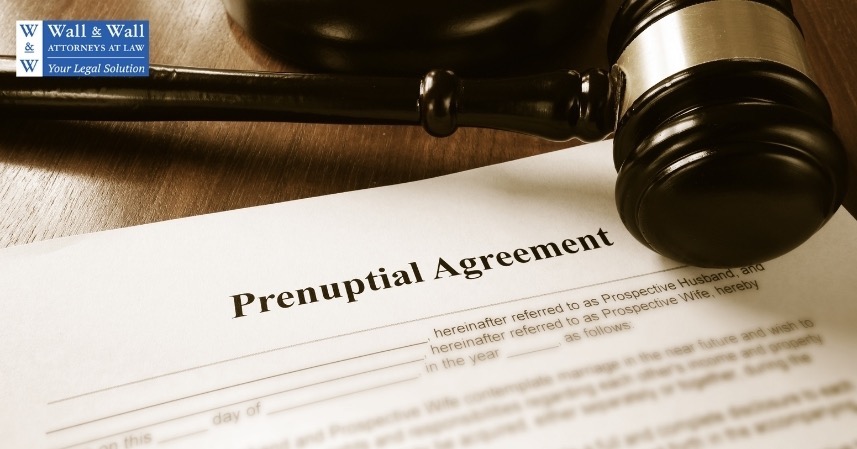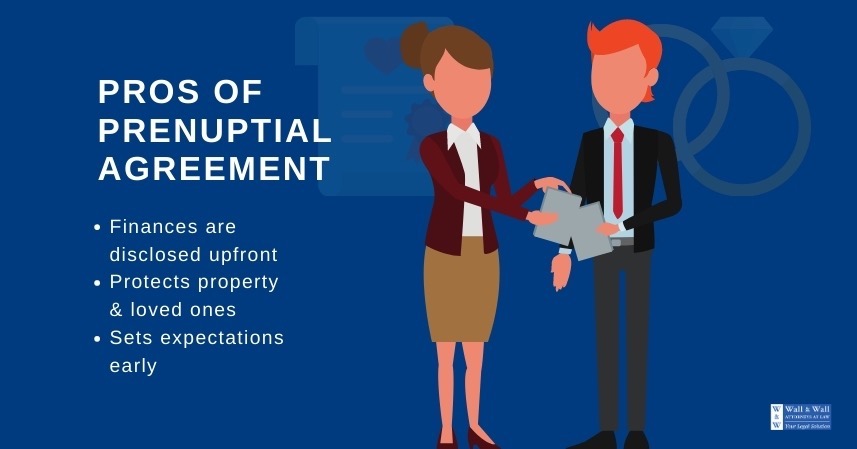In this blog, you will learn…
- Prenup Meaning
- What Does a Prenup Do?
- Things a Prenup Cannot Do:
- Don’t Have a Prenup
- Should I Get a Prenup?
- How To Get a Prenup?
Prenups (prenuptial agreements) were once typically used only by the wealthiest couples. But, over the past couple of decades, this legal agreement has become more and more common. People planning their marriages naturally want to protect their spouses and themselves from unexpected future difficulties. Getting a prenup is a way to alleviate unnecessary risk across the gamut of future financial and personal uncertainties.
What is a Prenup?
A prenup is a legal contract that allows engaged couples to make financial arrangements and work out non-financial matters, before entering the binding legal agreement of marriage. The prenup spells out how property and debts will be divided in the event of divorce or death.
Modifying a prenup can be done at any time during the marriage, with the approval of both parties. The state in which the couple resides or the one in which they got married may decide how the terms of a prenup agreement are enforced, depending on the laws in those respective states.
Who Should Get a Prenup?
Marriage is a personal relationship, but it’s also a legal contract. Many couples entering marriage with significant personal assets and debts amassed before marrying appreciate the benefits of a prenup, as a basic tool for providing the financial security they need, vs. risking leaving the decisions about their financial futures to a court system that has discretionary power to override one or both spouses’ intentions and preferences.
- When one person in the couple has significantly more at stake, for example business ownership. This can include financial interests and/or non-financial concerns.
- When one person has a child from a previous relationship. A prenup can be used to help clarify what children will receive in future circumstances. (This does not involve child support.)
- One person in the couple plans to delay finishing advanced education or making career progress in order to stay at home to support the spouse’s career and/or to raise children.
- One person has a large amount of debt.
- One person is expected to have much larger retirement accounts than the other spouse.
- The couple will live in a state where marital assets might not necessarily be divided in the fairest and reasonable way during a divorce, in the couple’s case.
What Happens in a Divorce If You Have a Prenup?
A prenup can help protect a person from unfair loss of assets owned before marriage, partial loss of an inheritance received during the marriage, or civil partnership. A prenup can also provide for the best interests and preference of spouses regarding children’s best interests. It can also address nonfinancial matters.
What Does a Prenup Do?
- The prenup states the couple’s plan for ownership of businesses, real estate, stocks, and other investments, personal property, and other assets.
- The prenup can address how non-financial assets, such as sentimental items, are to be divided.
- It addresses responsibilities for debts.
- Who will take possession of pets can be stipulated in a prenup.
- Protection of intellectual property, for example, inventions, business ideas, copyrights, commercial images, etc., can be included in a prenup.
- Financial or non-financial property to be given to children, other agreements for the benefit of children can be addressed. (Child support or child custody cannot be included in a prenup.)
- Although couples need formal Wills, the prenup can help by addressing what happens to life insurance policies and other distributions of assets in case of death.
- A prenup can even include genetic property, such as stored eggs, embryos, and sperm.
Things a Prenup Cannot Do:
- Alimony is usually not addressed in prenuptial agreements, although some states allow waiving the right to alimony as part of a prenup.
- Prenups cannot make agreements for child custody, child support, or visitation.
- A prenup cannot be used to establish causes or set up conditions for a divorce, such as: if a spouse drinks alcohol, the other person is entitled to an uncontested divorce.
- Premarital property is not usually included in a prenup. Normally, a prenup merely states that any assets a person owns at the time of the marriage will continue to be the sole property of that individual.
What Happens If You Don’t Have a Prenup?
Without a prenup, if spouses cannot come to an agreement during a divorce, about division of property, assignment of responsibilities, and/or any other arrangements, then those matters are left to the court. The judge will make decisions on who will take ownership of each individual asset and responsibility for debts, based on the court’s range of considerations in such cases, for example:
- Your and your spouse’s income and capacity for increased earnings
- Your amount of property and likely growth of assets
- The family’s standard of living
- Both spouse’s contributions to the family, including caring for children, maintaining the home, working outside the home earning income, and others
- The likely financial needs and responsibilities of both spouses
- Projected pension amounts
- The best interests of minor children, as the highest priority
Note that the basis for reasoning in the court’s decision-making is that what has accumulated during the marriage is to be equally divided during the divorce.
Should I Get a Prenup?
Today, many engaged couples with significant assets going into their marriage appreciate having a prenup as means of laying the most stable foundation for their marriage and possible future children. Having a prenup, created using a thorough prenuptial agreement checklist, alleviates the kinds of serious financial uncertainties that can naturally cause unnecessary and extreme pressure on relationships as people enter the legal contract of marriage. Ask an experienced prenup attorney for guidance in creating a prenup, especially if your finances are relatively complex.
Note that a postnup is the same as a prenup, but is for couples who are already married.) A postnup can help reduce difficulties a married couple may have, by allowing them to settle financial questions, so they can work on resolving issues without concerns about money complicating their efforts.
Wall & Wall Attorneys at Law, P.C., Salt Lake City, Utah
We are a family-owned law firm in Salt Lake City, Utah, specializing in family law. Since 1973, we have been helping people in Utah through divorce, child custody, child support, and many other matters of family law. We listen carefully and treat people with respect. We will help you examine all your options. We speak English and Spanish. We can provide interpreters for other languages, with advanced notice.
If you need a prenup or you want to know the prenuptial agreement cost in Utah, Schedule a Free 30-minute Prenuptial Agreement Consultation with Wall & Wall Attorneys at Law, P.C.(801) 441-2388
- Choosing Your Ally: Selecting a Proficient Family Law Lawyer in Utah – May 24, 2024
- Preparing for Divorce: Essential Steps with Utah Divorce Lawyers – April 29, 2024
- Championing Fathers’ Rights with Utah Family Law Attorneys – April 1, 2024


